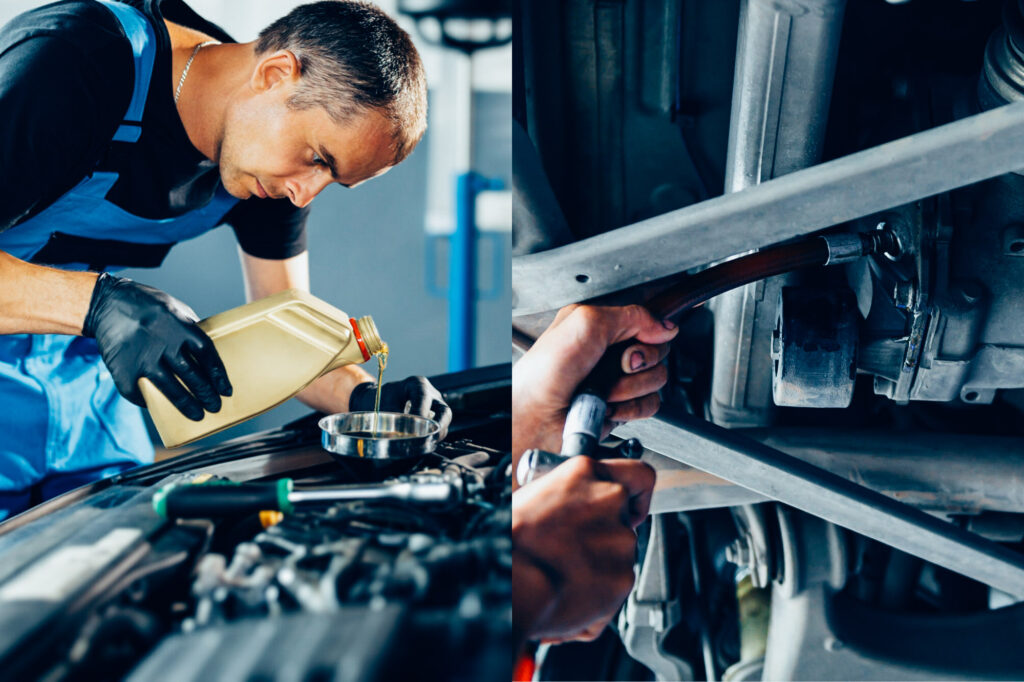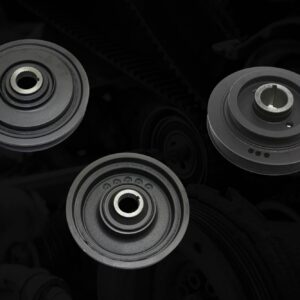Your vehicle’s differential has a set of gears that allow your vehicle to turn at different speeds. To keep these gears from grinding, it relies on differential gear oil to keep the moving parts lubricated.
What Is Differential Gear Oil?
Differential gear oil is found in your vehicle’s axle housing. It is also called gear lube or gear oil. Its main purpose is to lubricate the metal components in your differential, including your clutch packs, gears, and bearings. In a nutshell, a differential gear oil lubricates the part of your differential, and prevents metal-to-metal friction so that the differential won’t overheat.
Some differential gear oils are made of mineral oil, while others are made of synthetic fluid that’s manufactured in a laboratory.
Engine Oil vs. Gear Oil
Engine oil is different from gear oil. Gear oil is specially engineered to lubricate and protect gear systems. Engine or motor oil, on the other hand, lubricates engine parts.

Gear oil is also much thicker compared to engine oil. Many modern vehicles require engine oil with a viscosity grade that’s typically around 5W30 or 0W20. Gear oil, on the other hand, tends to have a higher viscosity. It’s often in the range of 75W90 or higher.
Engine oil has additives that help reduce corrosion and improve fuel economy. This type of oil is made specifically for the engine’s high running temperature. Meanwhile, gear oil is specifically designed to perform under high-pressure movements.
Many modern vehicles require engine oil with a viscosity grade that’s typically around 5W30 or 0W20.
–Anthony Harlin, ASE Certified Master Automobile Technician
How Much Gear Oil Goes In a Differential?
It’ll depend on your vehicle’s exact make and model. Refer to your owner’s manual for your vehicle’s exact differential oil capacity. Most differentials can hold as much as three quarts.
Some differentials need to be supplied with a secondary additive called friction modifier. Make sure that you verify that information as well.
How Often Should I Change My Differential Gear Oil?
It’s recommended to change your differential gear oil every 30,000 to 60,000 miles. The procedure can differ depending on the specific vehicle that you own.
Some differentials, for example, will have a plug for draining the differential and another plug for filling it up. On some vehicles, you may need to remove the housing cover.
Changing your differential gear oil is a tough and messy job. Also, gear oil has an awful smell. If you don’t have the right tools for the job, it’s best to ask a mechanic to do it for you.
Check out these tutorial videos in case you need to replace your rear differential fluid:
Can I Drive My Vehicle Even If My Differential Gear Oil Level Is Low?
Technically, you can still drive your vehicle even if it’s low on gear oil. However, you’ll damage your differential. Slowly, your gears will begin to grind and the metal shavings produced by friction will damage your differential and may cause it to fail.
How Will I Know If My Differential Gear Oil Level Is Low?
If you hear a howling, growling, or grinding sound coming from your front or rear differential, it’s time for a trip to an auto repair shop. If it isn’t caused by low oil levels, something else might be causing the strange noise.
If your gears aren’t properly lubricated, you may also notice a burnt oil smell coming from the area where your differential is. You may also have difficulty shifting gears. In the worst cases, your differential will overheat.
How Much Does It Cost to Change Your Differential Gear Oil?
Expect to spend around $70 to $200 for a differential gear oil change. The exact cost will depend on your ride’s year, make, and model. This excludes labor rates that apply in your area. You’ll also have to consider the cost of related repairs. For example, a mechanic might have to install new gaskets after changing your gear oil if your differential doesn’t have a drain plug.
How Much Does it Cost to Repair Your Differential?
If it’s too late for a gear oil change, and your differential already failed, you’ll have no choice but to replace it or have it rebuilt. This is a costly and complicated process. You’ll most likely spend anywhere between $2000 and $4000 for the whole thing.
To avoid spending a lot of money on repairs, make sure that you change your gear oil on time.
Getting the Best Gear Oil for Your Differential
Here are some of the things to consider when getting an aftermarket differential gear oil:

GL Rating
A gear oil’s GL rating will tell you how good it is at handling high-pressure and severe conditions. The higher the GL rating, the better the oil can handle high pressure.
However, this doesn’t mean that your vehicle automatically needs gear oil with a high GL rating. You’ll have to consider the type of vehicle that you own and the type of gear installed in your engine.
Viscosity
You also have to consider the viscosity rating of the gear oil you’re about to buy. On average, it should have a viscosity of 75/90. Like engine oil, gear oil is also available in both conventional and synthetic formulations. For synthetic oil, some manufacturers recommend a 75W140 viscosity grade.
Gear oil is usually thicker than engine oil. A thick oil can effectively lubricate and cushion all gears in the differential.
Any information provided on this Website is for informational purposes only and is not intended to replace consultation with a professional mechanic. The accuracy and timeliness of the information may change from the time of publication.






























